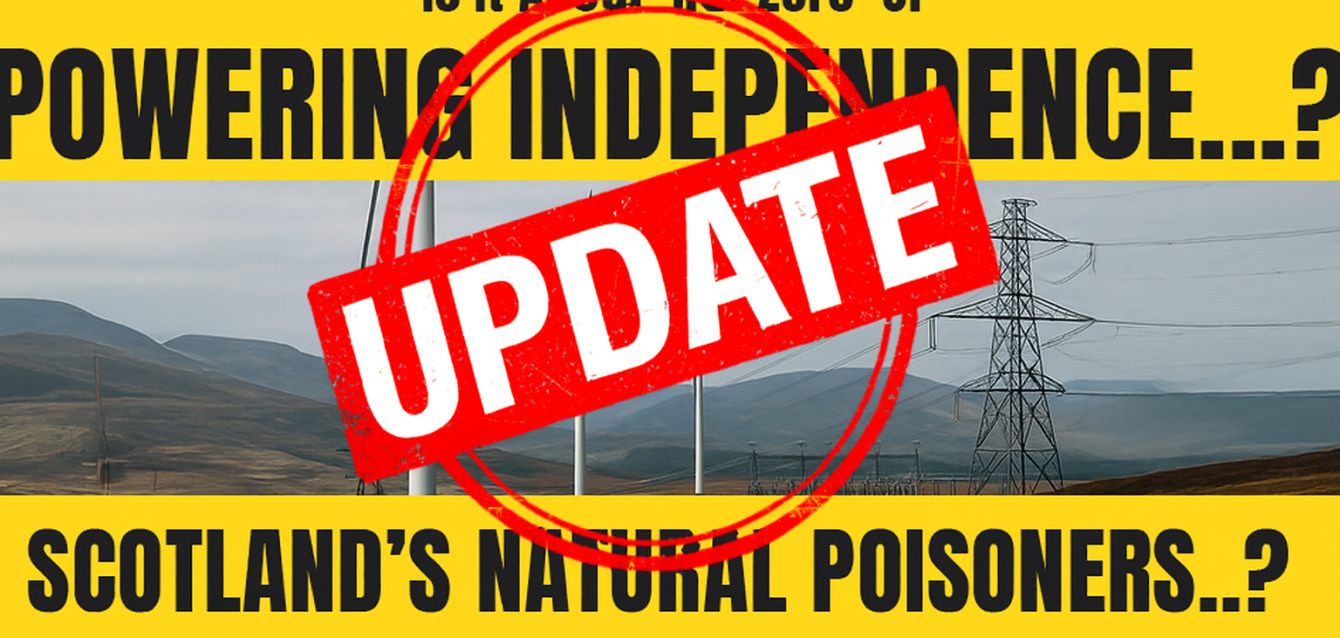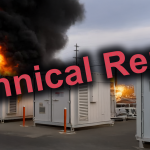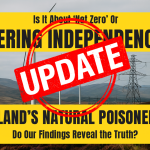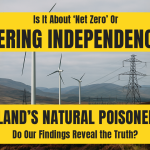When ObjectNow released its investigation on 7 September 2025, we examined the rapid escalation of wind farms, pylons, substations, and battery compounds across Scotland. Our analysis concluded that this build-out was not driven by climate policy alone. Instead, it was increasingly being used to demonstrate Scotland’s capacity for economic and energy self-sufficiency — a central pillar of the constitutional case for independence.
The Scottish Government’s newly published paper, Right to Decide: Scotland’s Energy, Democracy and Independence Narrative, has now confirmed that connection. The document openly links renewable generation and electricity exports to the national independence discussion.
Energy as a Symbol of Self-Sufficiency
The Right to Decide report presents renewable energy as both an environmental and constitutional asset. It highlights Scotland’s strong renewable capacity and the export of electricity to other parts of the UK as evidence of national strength. The same pattern identified by ObjectNow in September now appears in the government’s own words:
“Energy surplus is portrayed as proof that Scotland could stand on its own economically and operationally”.
Surplus Power as Political Capital
ObjectNow’s analysis showed that Scotland already generates significantly more electricity than it consumes. Our investigation described how this surplus has been used in ministerial speeches and policy papers as evidence of national capability. The Right to Decide paper mirrors that message by framing renewable output as an example of self-reliance and as a building block of the independence case. While the document treats this as a positive achievement, the pattern of using energy statistics to reinforce constitutional arguments is clear and consistent with what ObjectNow documented earlier.
Centralised Control and Governance
The Scottish Government’s paper also reaffirms the centralisation of decision-making power over large-scale energy developments. It references the importance of “strategic national control” in achieving energy and climate goals. This reflects the same structure described in ObjectNow’s report, where major projects are authorised by Scottish Ministers under Section 36 of the Electricity Act and are guided by the priorities of National Planning Framework 4. The combined effect is a system in which local councils and communities have limited influence over decisions that shape their surroundings.
Energy Policy and the Independence Narrative
Both ObjectNow’s September report and Right to Decide reach the same intersection between energy and constitutional identity. The government’s paper explicitly links control over energy resources to the argument for self-determination. It frames renewable generation not just as a response to climate change, but as an expression of Scotland’s ability to act as an independent state.
This confirms that Scotland’s renewable strategy now operates within a dual purpose: environmental ambition and constitutional positioning.
The Broader Implications
The publication of Right to Decide validates the key findings of ObjectNow’s investigation. It confirms that Scotland’s energy policy is being shaped by political objectives as well as environmental ones, that ministerial control has become the norm, and that energy statistics are used to reinforce national identity.
This does not diminish the importance of renewable energy, but it highlights the need for honesty about the motives driving its expansion.
A Call for Transparency
The Scottish Government’s own paper makes clear that energy and independence are now strategically linked. ObjectNow calls for full transparency about how these priorities are balanced, how national objectives influence local decisions, and how Scotland’s energy landscape is being used to serve constitutional goals.
Energy policy should reflect both environmental integrity and democratic accountability. The Right to Decide paper confirms that the debate now extends beyond net zero targets.
It is about power itself (political, structural, and national) and the right of Scotland’s people to understand how it is being exercised.





